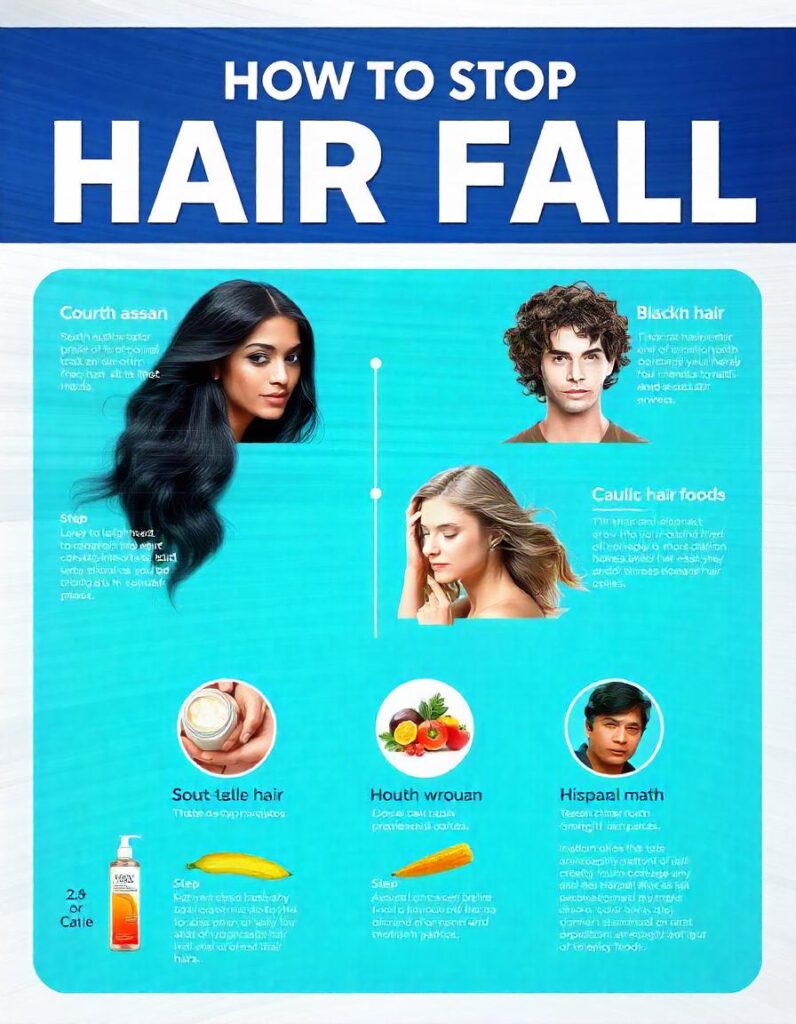Experiencing hair fall can be distressing, affecting both self-esteem and overall well-being. Some of hair fall daily ,but its normal because of hair growth. But excessive hair fall is not normal. It is due to many reasons some including health issues. Glowing skin and bright hair increase your beauty. This article explores effective strategies to stop hair fall, including dietary changes, home remedies, hair care practices, and medical treatments.
Understanding Hair Fall
Hair fall can be caused by various factors ranging from genetics and hormonal changes to nutritional deficiencies and stress. Understand about hair proxity will help you to treat hair fall.
FAQ:
- Q: What are the common causes of hair fall?
- A: Common causes include hormonal changes, stress, nutritional deficiencies, genetics, and certain medical conditions.
Dietary Changes for Healthy Hair
Nutrition plays a pivotal role in promoting hair health. Incorporating the right foods into your diet can significantly improve hair strength and reduce fall.
1. Protein-Rich Foods
Consuming adequate protein is crucial for hair growth and strength. Include lean meats, fish, eggs, legumes, and dairy in your daily meals.
FAQ:
- Q: How does protein deficiency affect hair?
- A: A protein deficiency can lead to hair thinning and weaker strands, increasing the risk of hair fall.
2. Iron and Zinc
Iron and zinc are important minerals that support healthy hair growth. Iron helps carry oxygen to hair follicles, while zinc plays a crucial role in tissue growth and repair. Include foods like spinach, lentils, pumpkin seeds, and red meat in your diet.
FAQ:
- Q: Can Iron deficiency cause hairfall?
- A: Yes, iron deficiency can contribute to hair loss, particularly in women. It’s vital to maintain adequate iron levels for healthy hair.
3. Omega-3 Fatty Acids
Omega-3 fatty acids nourish the scalp and promote hair growth. Foods rich in omega-3s include fatty fish (like salmon), walnuts, flaxseeds, and chia seeds.
FAQ:
- Q: How do omega-3 fatty acids help hair health?
- A: Omega-3s help maintain scalp health and support the hair growth process by reducing inflammation.
4. Biotin and Vitamins
. Biotin, a B-vitamin, is renowned for its importance in supporting healthy hair growth. Include foods such as eggs, nuts, and whole grains in your diet to boost your biotin intake .Additionally, vitamins A, C, D, and E are crucial; they can be found in fruits, vegetables, nuts, and dairy products.
FAQ:
- Q: What is the role of biotin in hair health?
- A: Biotin helps improve hair strength and appearance and may prevent hair loss when consumed adequately.
5. Hydration
Staying hydrated is vital for overall health, including hair growth. Water keeps the scalp hydrated and improves blood circulation, promoting hair follicles’ health.

FAQ:
- Q: How much water should I drink for better hair health?
- A: Aim for at least 8-10 glasses of water daily, or more if you’re active.
Home Remedies to Combat Hair Fall
Natural remedies can provide effective solutions for hair fall. Lets discuss some home remedies to prevent hairloss.
1. Aloe Vera
Aloe vera is known for its soothing properties and ability to nourish hair follicles. Apply fresh aloe vera gel to your scalp, leave it for 30 minutes, and rinse with a mild shampoo.
FAQ:
- Q: How often can I use aloe vera for hair treatment?
- A: Applying aloe vera once or twice a week is sufficient to promote scalp health.
2. Coconut Oil
Coconut is good for hair health. Massage warm coconut oil onto your scalp, leave it on for a few hours or overnight, and wash it out. You can Apply coconut oil with onion extract and apply on roots of hair. It will not only prevent hair fall but also increase hair health and your hair will also shine.
FAQ:
- Q: For which hair coconut oil should be used?
- A: Yes, but those with fine hair should use it sparingly to avoid greasiness.
3. Onion Juice
You can apply onion extract on hair by grinding it and apply extract on hair. You can also use onion hair mask. Apply freshly extracted onion juice to the scalp for 30 minutes before washing it out. For avoiding pungent smell of onion use rose water.
FAQ:
- Q: Does onion juice have any side effects?
- A: Some people might experience scalp irritation or mild burning; it’s best to do a patch test first.
4. Fenugreek Seeds
Fenugreek seeds have high protein content and nicotinic acid, both of which are essential for hair growth. Use them after soaking on hair roots.
FAQ:
- Q: How often should I use fenugreek for hair treatment?
- A: Using fenugreek once a week can yield positive results.
5. Green Tea
Drinking green tea help hair growth. You can also apply it on your hair.

FAQ:
- Q: Is there a benefit to drinking green tea for hair health?
- A: Yes, drinking green tea can improve overall health and potentially support hair health due to its antioxidant properties.
Hair Care Practices
Here are some essential hair care practices to minimize hair fall.
1. Gentle Washing Techniques
Washing hair too frequently can lead to dryness and damage. Wash your hair with good shampoo also do oiling before washing hair . This helps maintain natural oils and scalp health.
FAQ:
- Q: What type of shampoo should I use for thinning hair?
- A: Look for shampoos labeled for thinning hair or those with natural ingredients like biotin and essential oils.
2. Conditioning
Regular conditioning helps keep hair moisturized and manageable.
FAQ:
- Q: Should I use a leave-in conditioner?
- A: Leave-in conditioners can provide extra moisture and protection, particularly for dry or damaged hair.
3. Avoiding Heat Styling
Excessive heat styling can weaken hair and lead to breakage. Minimize the use of hair dryers, curling wands, and straightening tools. When you do style, use a heat protectant spray.
FAQ:
- Q: Can I use heat styling tools on wet hair?
- A: It’s best to avoid using heat tools on wet hair, as this can cause added damage and breakage.
4. Choosing the Right Hair Products
Using hair products with harsh chemicals can damage hair and contribute to hair loss. Opt for natural or organic products free from sulfates, parabens, and alcohol.
FAQ:
- Q: How can I know if a product is safe for my hair?
- A: Read product labels and choose those that prioritize natural ingredients. Look for customer reviews as well.
5. Limiting Tight Hairstyles
Try to avoid make high and tight pony tails it will cause hair loss. Opt for looser styles that reduce stress on the hair roots.
FAQ:
- Q: What hairstyles are best for minimizing hair fall?
- A: Loose hairstyles like braids or updos that are not tight are preferable to reduce tension.
Stress Management and Hair Health
Stress has been linked to hair loss, making it imperative to manage stress effectively. Here are some strategies for stress reduction.
1. Mindfulness and Meditation
Practicing mindfulness or meditation can alleviate stress and promote overall well-being. Research suggests that when you perform prayer (namaz) and go into sajda (prostration), blood flow increases to the scalp, which can help strengthen your hair.
FAQ:
- Q: How does mindfulness affect hair health?
- A: Reducing stress can improve blood circulation and support healthier hair growth.
2. Regular Exercise
Engaging in physical activity releases endorphins, which help manage stress levels. Aim for at least 30 minutes of moderate exercise most days of the week.
FAQ:
- Q: What type of exercises are best for stress relief?
- A: Activities like yoga, walking, jogging, or dancing can effectively reduce stress.
3. Adequate Sleep
Sleep is vital for physical and mental health. Aim for 7-9 hours of quality sleep each night to allow your body to recover and renew.
FAQ:
- Q: Can lack of sleep contribute to hair loss?
- A: Yes, poor sleep patterns can increase stress and affect overall hair health.
4. Seeking Support
Sharing your feelings can significantly reduce stress levels. Seek support from many platforms.
FAQ:
- Q: Why is social support important for mental wellness?
- A: Social connections can provide emotional comfort and practical help, reducing feelings of stress and isolation.

When to Seek Professional Help
If your hair fall persists despite trying various home remedies and lifestyle changes, it may be time to consult a professional.
1. Medical Evaluation
A dermatologist can assess your hair and scalp condition, perform tests if necessary, and recommend appropriate treatments based on the cause of hair loss.
FAQ:
- Q: How do I know if I need to see a specialist for hair loss?
- A: If you experience sudden hair loss or significant thinning that does not improve with at-home treatments, consult a healthcare professional.
2. Medications
Over-the-counter medications like minoxidil can aid in promoting hair regrowth. Discuss its suitability with a healthcare provider before use.
3. Hormonal Treatments
For those experiencing hair loss due to hormonal imbalances, treatments such as hormone replacement therapy may be beneficial. Consult your healthcare provider for a tailored approach.
FAQ:
- Q: How can I tell if my hair loss is hormone-related?
- A: A medical professional can evaluate your symptoms and possibly test hormone levels to determine any imbalances.
4. Advanced Treatments
In severe cases, treatments like hair transplants, laser therapy, or corticosteroid injections may be considered. A consultation with a trichologist or dermatologist can clarify suitable options.
FAQ:
- Q: How effective are hair transplant surgeries?
- A: Hair transplants are usually effective, with numerous patients experiencing noticeable increases in hair density.
Summary
Stopping hair fall involves a multi-faceted approach, including proper nutrition, natural remedies, effective hair care practices, stress management, and professional advice when necessary. By adopting a holistic strategy, you can promote healthier hair, reduce shedding, and enhance your hair’s overall appearance. Remember, patience is essential, as results may take time. With commitment and care, you can regain your confidence and enjoy a fuller head of hair.
FAQs Recap:
Q: Is hair fall a normal part of aging?
A: Yes, some degree of hair loss can be a natural part of the aging process, but excessive shedding may require attention.
Q: Can I stop hair fall completely?
A: While it may not be possible to stop hair fall completely, implementing various strategies can significantly reduce it and promote healthier growth.
Q: How long does it take for treatments to yield visible results?
A: The timeframe for visible results varies depending on the treatment and individual response; typically, you may start to see improvements within 3 to 6 months.

Pingback: Trendy Hairstyles for Girls 2025: A Guide to Fun and Fabulous Looks